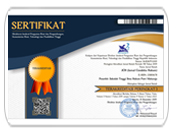PERANAN PENGHULU TERHADAP HAK ULAYAT DI MINANGKABAU
Eviandi Ibrahim(1*)
(1) STIH Putri Maharaja Payakumbu
(*) Corresponding Author
Abstract
Keywords
Full Text:
PDFReferences
Amran, A. (2017). Penyelesaian sengketa tanah ulayat melalui lembaga adat di minangkabau sumatera barat. Jurnal hukum acara perdata adhaper, 3(2), 175–189.
Andiki, F., Prabandari, A. P., Studi, P., Kenotariatan, M., Hukum, F., & Diponegoro, U. (2019). Peralihan Hak Tanah Ulayat Di Kabupaten Dharmasraya. Notarius, 12(2), 856–865. https://doi.org/10.14710/nts.v12i2.29130
Buan, R. (2017). Kedudukan Hak Ulayat Dalam Status Kawasan Lindung Di Sumatera Barat. Bina Hukum Lingkungan, 1(2), 249–263. https://doi.org/10.24970/jbhl.v1n2.19
Ismail, I. (2010). Kedudukan dan Pengakuan Hak Ulayat dalam Sistem Hukum Agraria Nasional. Kanun: Jurnal Ilmu Hukum, 12(1), 49–66. https://doi.org/10.24815/kanun.v12i1.6287
Rifana, R. (2016). Peran Ninik Mamak Dalam Pemanfaatan Tanah Ulayat Di Kenagarian Lipat Kain Selatan. JOM Fakultas Hukum, 3(2), 1–15. https://doi.org/10.1017/CBO9781107415324.004
Yunimar. (2017). Pensertipikatan Tanah Wakaf Yang Berasal Dari Tanah Ulayat Di Minangkabau Dalam Rangka Mewujudkan Kepastian Hukum. Jurnal Normative, 5(1), 1–11.
Soeroso Wingjodipoero, (1982). Pengantar dan Asas-Asas Hukum Adat, Gunung Agung, Jakarta.
Dharmayuda, I. M. S. (2009). Status Dan Fungsi Tanah Adat Bali Setelah Berlakunya UUPA. Jakarta: CV Kayumas Agung
Edison; Nasrun DT.Marajo Sungut. (2010). Tambo Minangkabau (Budaya Dan Hukum Adat Minangkabau. Bukit Tinggi: Kristal Multi Media.
Sukirno. (2018). Politik Hukum Pengakuan Hak Ulyat. Jakarta: Prenadamedia Group. Sutedi,
Nurmi Taswir, (2000). Hukum Agraria Nasional Indonesia, Unand Press, Padang.
Sayuti Thalib, (1985). Hubungan Tanah Adat dengan Hukum Agraria di Minangkabau, Bina Aksara, Jakarta.
DOI: http://doi.org/10.33760/jch.v6i1.296
Refbacks
- There are currently no refbacks.
Copyright (c) 2020 JCH (Jurnal Cendekia Hukum)

This work is licensed under a Creative Commons Attribution-ShareAlike 4.0 International License.
Published by STIH Putri Maharaja Payakumbuh
Indexing by


















